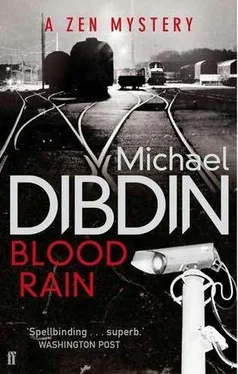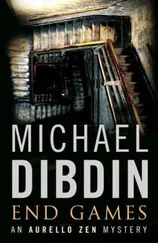Michael Dibdin - Blood rain
Здесь есть возможность читать онлайн «Michael Dibdin - Blood rain» весь текст электронной книги совершенно бесплатно (целиком полную версию без сокращений). В некоторых случаях можно слушать аудио, скачать через торрент в формате fb2 и присутствует краткое содержание. Жанр: Полицейский детектив, на английском языке. Описание произведения, (предисловие) а так же отзывы посетителей доступны на портале библиотеки ЛибКат.
- Название:Blood rain
- Автор:
- Жанр:
- Год:неизвестен
- ISBN:нет данных
- Рейтинг книги:3 / 5. Голосов: 1
-
Избранное:Добавить в избранное
- Отзывы:
-
Ваша оценка:
- 60
- 1
- 2
- 3
- 4
- 5
Blood rain: краткое содержание, описание и аннотация
Предлагаем к чтению аннотацию, описание, краткое содержание или предисловие (зависит от того, что написал сам автор книги «Blood rain»). Если вы не нашли необходимую информацию о книге — напишите в комментариях, мы постараемся отыскать её.
Blood rain — читать онлайн бесплатно полную книгу (весь текст) целиком
Ниже представлен текст книги, разбитый по страницам. Система сохранения места последней прочитанной страницы, позволяет с удобством читать онлайн бесплатно книгу «Blood rain», без необходимости каждый раз заново искать на чём Вы остановились. Поставьте закладку, и сможете в любой момент перейти на страницу, на которой закончили чтение.
Интервал:
Закладка:
‘You’re going native,’ he said through a bite of the pastry.
‘It’s just common sense,’ the woman replied, a little snappily. ‘They know all about us, but we haven’t the first idea about them.’
Zen finished his coffee and called for a glass of mineral water to wash down the sticky pastry.
‘If you start thinking like that, you’ll go mad.’
‘And if you don’t you’ll get killed.’
Zen snorted.
‘Don’t flatter yourself, Carla. Neither of us is going to get killed. We’re not important enough.’
‘Not to be a threat, no. But we’re important enough to be a message.’
She pointed to the newspaper.
‘Like him.’
‘How do you mean?’
The woman did not answer. Zen finished his pastry and wiped his lips on a paper napkin tugged from its metal dispenser.
‘Shall we?’ he said, dropping a couple of banknotes on the counter.
Outside in Piazza Carlo Alberto, the Fera o Luni market was in full swing. Zen and his adopted daughter, Carla Arduini, had made this their meeting point from the moment that she had arrived in Sicily a month earlier, on a contract from her Turin computer firm to install a computer system for the Catania branch of the Direzione Investigated AntiMafia. It was roughly half-way between the central police station, where Zen worked, and the Palazzo di Giustizia where Carla was battling with the complexities of setting up a network designed to be both totally secure and interactive with other DIA branches in Sicily and elsewhere.
Since arriving in the city, Zen had taken to leaving the window of his bedroom open so that he was awakened about five o’clock by the first birds and the barking of the local dogs, in time to watch the astonishing spectacle of sunrise over the Bay of Catania: an intense, distant glow, as though the sea itself had caught fire like a pan of oil. Then he showered, dressed, had a cup of homemade coffee and left the building, walking north beneath hanging gardens whose lemon trees, giant cacti and palms were teasingly visible above.
At about seven o’clock, he strode up to one of the conical-roofed booths in the Piazza Carlo Alberto which sold soft drinks, and ordered a spremuta d’arancia. In fact, he didn’t need to order. The owner, who had spotted Zen’s tall figure striding across the piazza, was already slicing blood-red oranges, dumping them in his ancient bronze press, and filling a glass with the pale orange-pink juice. Zen drank it down, then walked over to the cafe where he knew that Carla would be waiting for him. It was all very reassuring, like the rituals of the family he had never had.
When he and Carla emerged from the cafe, the sky above was delivering an impartial, implacable glare which merely hinted at the inferno to come later in the day, when every surface would add its note to the seamless cacophony of heat, radiating back the energy it had absorbed during hours of exposure to the midday sun.
A woman who looked about a hundred years old was roasting red and yellow peppers on a charcoal brazier, muttering some imprecation or curse to herself the while. Behind their wooden stalls drawn up in ranks in the square, under their faded acrylic parasols, traders with faces contorted into ritual masks either muttered a sales pitch in the form of a continual litany, as if reciting the Rosary, or barked their wares in harsh, rhetorical outbursts like the Messenger in some ancient play announcing a catastrophe unspeakable in normal language. This speech duly delivered, they surrendered the stage to one of their neighbours and reverted to being the unremarkable middle-aged men they were, gazing sadly at the goods whose praises they had just been singing, until the time came to don the tragic mask again and announce in a series of blood-curdling shrieks that plump young artichokes were to be had for seven hundred and fifty lire a kilo.
And not only artichokes. Just about every form of produce and merchandise known to man was on sale somewhere in the piazza, and those that were not on display — such as women, or AK-47S in their original packing cases — were available more discreetly in the surrounding streets. Zen and Carla walked through the meat section of the market, a shameless display which said, in effect, ‘These are dead animals. We raise them, we kill them, then we eat them. If they’re furry or have nice skin, we also wear them, but that’s at the other end of the piazza.’
And it was this end that they had now entered, away from the specialist sellers of olives and peppers, fennel and cauliflowers, tomatoes and lettuce. Here it was all clothing, household goods and general kitsch and bric-a-brac, and a significant number of the traders were illegal extracommunitari immigrants from Libya, Tunisia and Algeria. An understood and accepted form of racism was in force: the locals wouldn’t accept food from black hands, but they were perfectly happy to buy socks and tin-openers and screwdrivers from them, as long as the price was right.
‘What were you saying about the body in the train?’ asked Aurelio Zen as he and his companion passed the fringes of the market and emerged into the startlingly empty street beyond.
Carla glanced around before replying.
‘The buzz in the women’s toilet is that it wasn’t the Limina boy at all.’
They walked in silence until they came to Via Umberto, their traditional parting place.
‘Which judge is handling the case?’ asked Zen.
‘A woman called Nunziatella. First name Corinna.’
‘Do you know her?’
‘We’ve met a few times, and she seems to like me, but obviously I try to keep out of her way. A humble technician like me is not supposed to interfere with the work of the judges any more than is strictly necessary.’
Zen smiled, then kissed the woman briefly on both cheeks.
‘Buon lavoro, Carla.’
‘You too, Dad.’
Zen walked down Via Umberto to the corner, then turned into Via Etnea, the town’s main street. As he crossed, he glanced as always at the snow-capped mass of Etna to the right, looming up over the city like a nightmare acne pimple. After that, it was a short and pleasant walk along a hushed back-street to the little piazza where the Questura was situated.
With a nod to the armed guard in his bullet-proof booth at the door, Zen entered the building and went upstairs to his office: a cool, spacious room on the second floor of the elegant eighteenth-century palazzo, formerly a bank, which now housed the Catania police headquarters. Floor-length windows gave on to a balcony commanding a view of the street below. The walls were adorned with photographs of Carla Arduini and Signora Zen, as well as a framed poster entitled Venezia forma urbis, a large collage of aerial photographs forming a precise and evocative map of Zen’s native city.
He had never bothered to personalize his temporary quarters like this before, and if he had now, it was because he had reluctantly accepted that these were not temporary. On the contrary, Zen had every reason to suppose that he would be stuck in Catania for the rest of his career.
The proposition which had been made to him in Rome by the famous film director known as Giulio, prior to Zen’s visit to Piedmont, had turned out to be as false as it was flattering. Zen had been privately advised that an elite corps was being put together to smash the Mafia once and for all, and that following Zen’s ‘anti-terrorist triumph’ in Naples he had been chosen to join this select group, despite the notorious inconveniences and risks, occasionally fatal, of a posting to Sicily. The deal had been that in return for Zen’s assistance in the Aldo Vincenzo affair, Giulio’s contacts at the Interior Ministry would arrange for him to be sent not to one of the island’s hot spots but to an attractive backwater on the fringes of the real action. Syracuse had been mentioned as one possibility: a city ‘possessing all the charm and beauty of Sicily without being tiresomely Sicilian’, as Giulio had so invitingly put it.
Читать дальшеИнтервал:
Закладка:
Похожие книги на «Blood rain»
Представляем Вашему вниманию похожие книги на «Blood rain» списком для выбора. Мы отобрали схожую по названию и смыслу литературу в надежде предоставить читателям больше вариантов отыскать новые, интересные, ещё непрочитанные произведения.
Обсуждение, отзывы о книге «Blood rain» и просто собственные мнения читателей. Оставьте ваши комментарии, напишите, что Вы думаете о произведении, его смысле или главных героях. Укажите что конкретно понравилось, а что нет, и почему Вы так считаете.











